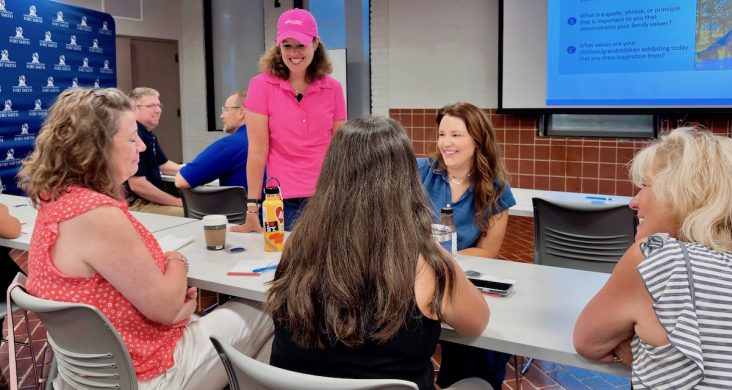Communication key to connecting generations in a family business
by June 25, 2024 4:01 pm 366 views

Katherine Dunlevie, president and CEO of The Family Office at Synovus, talks to attendees at a breakfast seminar at UAFS’ Family Enterprise Center. (photo courtesy of UAFS)
Two family business consultants shared the five essential steps to building a family enterprise mindset with attendees at a breakfast seminar hosted Tuesday (June 25) by the University of Arkansas at Fort Smith’s Jim Walcott Family Enterprise Center (FEC).
Katherine Dunlevie, president and CEO of The Family Office at Columbus, Ga.-based Synovus, and Jennifer Pratt, senior vice president and director of strategic services at Synovus, told those attending that balancing family, wealth and business can be tricky but it’s important to juggle all the hats they wear.
“As you know, when you wear your business hat, you make decisions in the business realm that can have an impact on your family. … We try to always figure out the balance between the economic side and the relationship side,” Pratt said.
The Family Office at Synovus specializes in personalized wealth management and growth strategies. With 47 employees in Alabama, Georgia, and Tennessee, the firm works with more than 90 families and managed assets exceeding $10.8 billion as of March 2024. The firm focuses on tailoring services to meet each family’s unique financial and interpersonal needs.
Dunlevie said in family enterprise there is a shift in mindset to a focus on something that must be bigger than operating a business. The family enterprise mindset must include looking at financial assets, real estate, heirloom assets, philanthropy, deferred assets and non-financial or human assets.
There are five essential steps – culture, communication, connection, commonality and choice – to adapting to a family enterprise mindset, the duo said. The first step – culture or defining the core values of the company – will set how everything comes together and comes to life. It will incorporate the mission, the vision, the value and the purpose, Dunlevie said.
“I think most families don’t think about the culture of the business, but there can be overlap with culture of family and business. Values of a family mold the culture of the business,” she said.
There must be a conscious effort to move from intuitive communication to intentional communication, Pratt said. There is a difference between what someone thinks should be shared and what their family wants to know, making transparency an integral part of intentional communication, she said.
“What we have found is that they (next generations of families in a business) want to understand the why. They say, ‘I hear we are doing this, making this acquisition, doing this thing, but I don’t understand the why.’ More detail is important,” Pratt said.
The next step is connection. The older generation in a family enterprise needs to find ways to engage with the next generation. Then they need to educate and empower, Dunlevie said.
“You have to look at how we can we start empowering that next generation as future owners, how can they lead small things and have a voice,” she said, adding that you can’t just have a meeting and an annual family meeting. Something has to be done to make it fun. “If you want to connect, connecting is experiences as well.”
That communication will lead to choice, because the next generation might not always want to do things the way they have been done, Pratt said. This takes looking at the things that bring common ground to families, the duo said.
“And stay away from the things that are polarizing. We are seeing more polarization in generations. Some are struggling because they have kids who think very differently, Dunlevie said. “This is probably the hardest one.”
The final step to gaining a family enterprise mindset is choice. There needs to be a discussion about voice versus vote, opportunity versus obligation and fair versus equal.
“They have got to feel like they have an offramp and they are able to be themselves,” Dulevie said.
When making the decisions about succession planning, it is important to “play a plan forward” and look at how decisions will impact all the players in the future, she said.
“It does take work. It takes time. But, oh my goodness, the benefits we see of family staying together, the next generation being empowered to lead, the values and legacies that you really want to hold on really start now by having intentional conversations,” Pratt said.
FEC Director Justin Smith said that though issues and opportunities facing family enterprises are broad and nothing can be accomplished in one day, UAFS feels it is beneficial to bring in speakers who can provide specific information that might make a difference.
